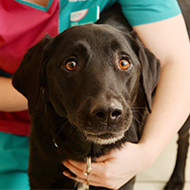
PDSA warns pet owners of festive hazards for pets
A seven-year-old Labrador named Marley needed life-saving surgery after eating over 30 home-made gingerbread Christmas tree decorations – including the ribbons attached to them – which caused a potentially fatal blockage.
Marley’s owner Rachael Bulmer (37), from Bournemouth, had been baking the decorations and left them to cool on the kitchen counter.
“I thought I’d left them safely out of reach,” she said, “but when I noticed some were gone I instantly knew who had taken them.
“Over the years Marley’s been no stranger to eating things he shouldn’t and usually they pass through. But this time he started acting strangely and looked like he was going into shock. He was violently sick and brought up some of the ribbon.”
She called PDSA Pet Hospital in Bournemouth, and was instructed to bring Marley in immediately. The dog was rushed into emergency surgery to remove the blockage.
During the procedure, it was also found that Marley had swallowed bones, which had become lodged in his stomach. Ultimately, it took a total of three hours and two operations for PDSA’s skilled veterinary team to remove all 34 ribbons from the dog’s stomach.
PDSA senior vet Aoife Clancy said: “It was a lengthy, high-risk surgery. Marley’s chances of surviving the night were looking poor, so he was transferred to the out-of-hours provider, Vets Now, so he could be cared for overnight. Thankfully he pulled through but needed critical round-the-clock care for four days before he could go home.”
Marley is now recovering at home on strict cage rest, his owners have thanked the PDSA veterinary team for their hard work and care.
PDSA is urging pet owners to ensure they keep festive food and decorations out of reach of pets this Christmas, and have released a Pet Survival Guide with further information.
Image (c) PDSA



 The Veterinary Medicines Directorate (VMD) is inviting applications from veterinary students to attend a one-week extramural studies (EMS) placement in July 2026.
The Veterinary Medicines Directorate (VMD) is inviting applications from veterinary students to attend a one-week extramural studies (EMS) placement in July 2026.